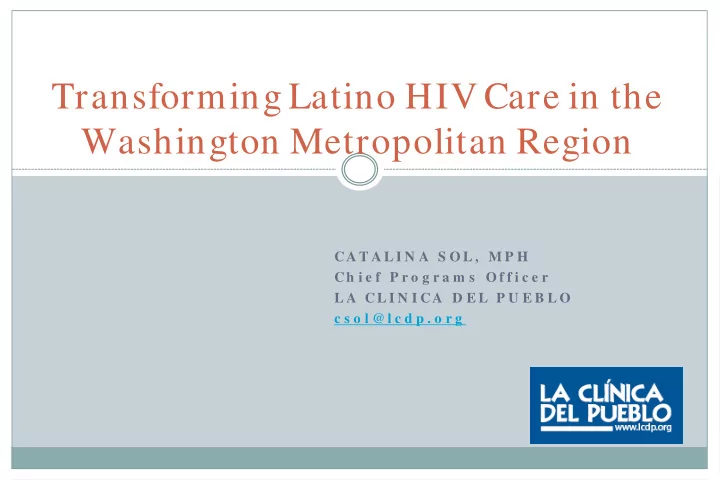

Transforming Latino HIV Care in the Washington Metropolitan Region CA T A L I N A S O L , M P H Ch i e f P r o g r a m s O f f i c e r L A CL I N I CA D E L P U E B L O c s o l @ l c d p . o r g
La Clínica del Pueblo Founded in 1983 in response to first Salvadorian immigrant wave to area (1980s) as volunteer-run clinic Today a Federally Qualified Health Center and Patient Centered Medical Home integrated with community-based public health approach Immigration status is most significant social determinant of health affecting clients
Immigration Status and HIV For 22 years, the “HIV ban” prohibited HIV positive immigrants from becoming legal permanent residents Immigration status restrictions to benefits , education, employment, stability Immigration status as a social determinant of HIV risk Immigration status is only factor besides poverty now determining health access through marketplaces Ryan White, District of Columbia (Alliance) notable exceptions
Country of Origin HIV Patients (N=295)
Barriers to Care for HIV Positive Latinos Conflicts between work and medical care Instability/ lack of availability of housing Immigration issues Lack of family/ support structures Lack of linguistically and culturally appropriate services, particularly mental health services Stigma
La Clinica’s Model of Care: Direct Services Patient Centered Medical Home Bilingual/ Bicultural Services on-site/ co located Interdisciplinary care teams Flexible Warmth Safe Space Advocacy, participation in local planning, public policy
La Clinica’s Quality Indicators Entry to Care: 90% or above Over 90% of newly diagnosed patients are seen by provider within 30 days of diagnosis (Quarterly Quality reports) Engagement in Care: 85% or above 85% of medical patients consistently meet HRSA HIV/ AIDS Bureau standard for engagement in care of not having gap in medical visits over last 24 month (Quarterly Quality reports) Viral Suppression: 88% 88% of clients with at least one medical visit in 2013 were suppressed at their last visit (RSR 2014)
SPNS Workforce Capacity Development Initiative 8 HRSA HIV/ AIDS Bureau Special Projects of National Significance Partners: La Clinica del Pueblo and George Washington University, Latino Health Research Center Contractors: Fenway Health (Evaluator), Qualis (Practice • Transformation Coach) Collaborators: PA-Mid Atlantic AETC and HIVMHRC • • The TLHC Intervention is intended to enhance LCDP HIV workforce’s readiness and capacity for the delivery of patient-centered care framed by the medical home model that will optimize human resources and patient health outcomes for Latinos LWHA in the DC area . • What works in what we do? Where and how can we improve?
Expected Outcomes 9 Optimization of Integration of the use and Improve Team-based Integration of Community exchange of involvement of care and HIV and Health Workers health patient in relationship behavioral care (CHW) into information for disease self- building services healthcare team decision making management purposes
Conclusions High quality outcomes can be achieved for “difficult” populations with community/ clinic providers + health system providing access to care and medications Reduction in HIV health disparities for Latino immigrants directly related to reduction around immigration barriers Community/ academic partnerships can help us script and improve our models of care
Recommend
More recommend